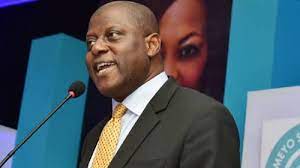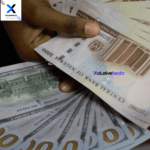CBN Cleared $7 Billion in Overdue Foreign Exchange

On Wednesday, the Central Bank of Nigeria (CBN) declared that all legitimate Foreign Exchange (FX) arrears owed to different economic sectors had been paid.
The CBN governor, Mr. Olayemi Cardoso, made a significant commitment to handle an inherited backlog of $7 billion in outstanding liabilities, which was fulfilled by the FX settlement.
That came on Wednesday when the naira posted notable one-day gains and kept rising at the official and black markets.
The local currency increased by N100 in a single day, closing at N1, 490/$1 on the parallel market, from N1, 590 on Tuesday.
In a similar, the naira closed at N1, 492.61 to the dollar on Wednesday at the official Nigerian Autonomous Foreign Exchange Market (NAFEM), up N67.96 from N1, 560.57 on Tuesday.
In a statement, Mrs. Hakama Sidi Ali, the acting director of corporate communications at CBN, revealed that the bank had paid off all of its foreign exchange debt.
According to Ali, Apex Bank has paid out $1.5 billion to settle debts owed to bank clients, thereby clearing the remaining amount of the FX backlog. She revealed that these transactions were carefully examined by independent auditors from Deloitte Consulting to make sure that only valid claims were honored.
Ali went on to say that any erroneous transactions were immediately reported to the appropriate authorities for additional examination.
To regain credibility and confidence in the Nigerian economy, Cardoso recently reassured investors, saying, “We made clearing the FX backlog a priority.”
“At this point, I can tell you that we have cleared all real, verifiable transactions. We needed to go through an impartial and trustworthy process to ascertain the authenticity of those obligations.
“We have completely overcome this obstacle to market confidence in the nation’s capacity to fulfill its obligations.”
The central bank stated that the last recapitalization of Nigerian banks was carried out in 2005 and reaffirmed its commitment to advancing the current plans.
The action was taken as part of steps to maintain the stability of the banking system, according to Mr. Muhammad Sani Abdullahi, Deputy Governor of the Economic Policy Directorate at the CBN, during a presentation on Wednesday at the CITI-CEEMA Macro Conference in London.
According to Abdullahi, the planned consolidation aimed to ensure dynamic macroeconomic and banking industry stress testing to assess system vulnerabilities and risk in the banking system, support the proposed targeted $I trillion economy to align with current dynamics, support monetary policy transmission, and enforce risk-based supervision to ensure Nigerian banks remained safe and sound.
Additionally, according to Abdullahi, the spread shrank to N222.24/$ from N662.59/$ following interventions, indicating a moderating of exchange rate volatility.
He continued by saying that the FX rate closed at N/$1,625.23 on March 8, 2024, down 10.32% from N/$1,473.26 on February 13, 2024.
FX rates closed at N1, 625.23/$ on March 8, 2024, a slight increase of 0.33 percent from N1, 630.66/$ on February 27, 2024.
The Monetary Policy Committee (MPC) meeting in February outlined an overall strategy that included clearing the backlog of FX transactions to stabilize the exchange rate, reduce import inflation, and boost confidence in the banking sector and the economy.
Cardoso set expectations for steady increases in Nigeria’s foreign currency reserves and better foreign exchange market liquidity during the meeting and a conference call with foreign portfolio investors that followed.
This month, the CBN reported that its external reserves had increased significantly, by $993 million to $34.11 billion as of March 7, 2024—the highest amount in eight months.
The notable increase in remittance payments from Nigerians living abroad and the rise in foreign investor purchases of local assets, such as government debt securities, were the main drivers of the month-over-month increase.
Cardoso disclosed in a recent exclusive interview with Arise Television, THISDAY’s broadcast division, that roughly $2.4 billion of the federal government’s alleged $7 billion in outstanding foreign exchange liabilities were not eligible for settlement.
He added that the current total outstanding FX obligations remained at $2.2 billion and that the bank had settled verified FX requests, which at the time totaled $2.3 billion.
Cardoso said that a portion of the $7 billion in outstanding FX claims were illegitimate, citing the results of a forensic audit conducted by Deloitte Management Consultant on the apex bank’s request.
The governor of the central bank also expressed confidence that the remaining foreign exchange liabilities would be settled soon. He insisted that FX requests that weren’t legitimately made would not be paid for by CBN. He said that to address the discrepancies found, the bank had written to authorized dealers.
In the meantime, yesterday’s daily turnover was $268.29 million, up 37.52 percent from the Tuesday quote of $195.13 million.
Similarly, N1, 350 was the lowest spot rate ever recorded, and N1620 was the highest spot rate.
To accomplish its goals for monetary policy, Abdullahi stated that the central bank would keep cultivating trust and strategic alliances with the investor community. He added that current reforms are intended to foster an environment that is conducive to business and that Nigeria remains a desirable destination for investors from emerging markets.
Investors were informed by the CBN deputy governor that the central bank was optimistic about the new monetary policy initiatives and their potential to boost the Nigerian economy. In the future, he said, the central bank would be dedicated to resolving the trade-offs that currently exist between output growth and price stability, as well as striking a balance between monetary policy credibility and flexibility.
Additionally, Abdullahi reaffirmed the top bank’s commitment to expanding financial markets and enhancing FX market liquidity. In addition, he declared that the bank would monitor transactions involving digital assets and promote greater transparency in the remittance environment.
Abdullahi reiterated the top bank’s pledge to maintain price stability that supports increased output.
To make sure the bank achieved its goals, he pledged to continuously improve the tools of monetary policy. “We are committed to improving our communication channels to effectively anchor the expectation of economic agents,” he continued.
The CBN deputy governor concluded by saying that the current central bank leadership would make sure the financial system remained stable, safe, and resilient and that ongoing engagement with pertinent stakeholders would support these efforts.
He stated that in addition to coordinating the shift to an IT framework, the bank was striving to achieve and sustain a positive real interest rate.








